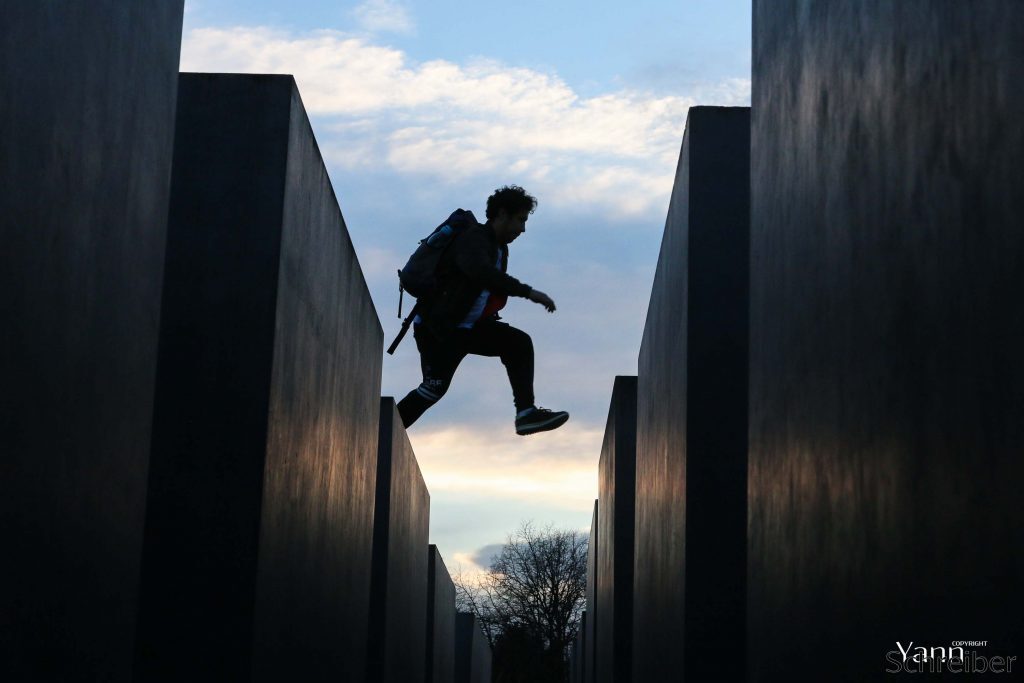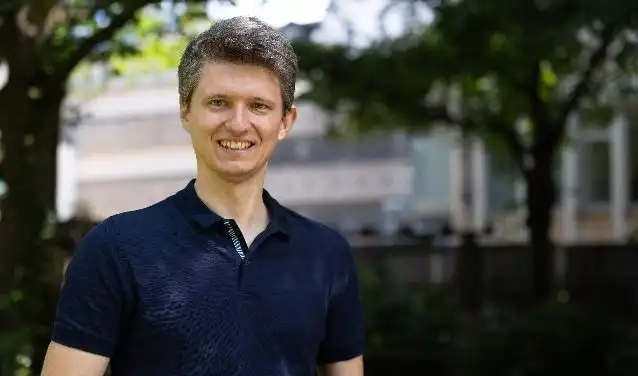Home>Yann Schreiber: "Journalism is a job that chooses you"
26.05.2022
Yann Schreiber: "Journalism is a job that chooses you"
We met Yann Schreiber a few years ago when he was finalising his Master’s degree in Journalism and International Affairs. He had just received several prizes from the prestigious Society of Professional Journalists, in particular for a video and a photo report produced during his exchange year at Ohio State University. After now a few years of practice, he still keeps the same passion for journalism.
You graduated from the Sciences Po School of Journalism and the Paris School of International Affairs’ joint master in 2017. Since then, you’ve been working as a journalist in Frankfurt Am Main. Can you tell us a bit about your transition from university to professional life?
I joined the double degree programme after a Bachelor's at the Franco-German European campus in Nancy. During my Masters, I started working as a freelancer at Radio France, where I was later hired right after graduating from Journalism school. I then joined AFP, which was looking for a business correspondent in Frankfurt, after passing the "Bourse AFP", an application procedure for young journalists who want to join Agence France-Press.
You have often worked between languages and cultures (English at Ohio State University during your study abroad, French in Paris, and German in Frankfurt Am Main). How do you think these international experiences have affected the way you view your profession?
When you are a correspondent, you translate a lot: words and sentences, of course, but you also translate between cultures. You have to know how to make national news interesting and relevant for an international audience. Experience abroad clearly makes it easier to understand this and makes you more capable of doing so. The American journalism I learned and experienced at Ohio State, for example, still has an impact on my work today and taught me a lot of things that I still rely on, and that were confirmed at Journalism School afterwards: rigour on sources, clear and direct writing, media law, etc.
In addition to your written journalism, you also have a photojournalism practice. Have you always been interested in both means of telling a story? What sparked your interest in these two mediums?
 I've always loved photography and video. Even in school, I have always been keen to immortalise class trips and events. I have kept this passion for images. I think that a story can be told in several ways, which are often complementary. Video or photos often benefit from a text with contextual information, and a written report gains enormously if it is well illustrated. Journalism today is necessarily multimedia in its consumption, so it is essential to think of these different formats together from the beginning and when you plan stories.
I've always loved photography and video. Even in school, I have always been keen to immortalise class trips and events. I have kept this passion for images. I think that a story can be told in several ways, which are often complementary. Video or photos often benefit from a text with contextual information, and a written report gains enormously if it is well illustrated. Journalism today is necessarily multimedia in its consumption, so it is essential to think of these different formats together from the beginning and when you plan stories.
On your website, you mentioned that you taught an undergraduate class at Sciences Po about journalism and democracy. Could you tell us a bit more about that experience? What was it like to turn the tables and be the professor instead of the student?
Indeed, I had the chance to teach for a semester on "my" campus in Nancy. It was an elective seminar with some 25 second-year bachelor students. We talked about the place of the media in our society, the challenges and what daily life looks like for journalists. Practical exercises were a big part of the course: the students wrote news stories and imagined the front page of newspapers, and part of the final exam was a simulation of editorial work. I thought it was a great experience – why not do it again when I come back to work in France? The discussions were very interesting and the students' work was of a very high quality. Being on the other side, as a teacher and no longer a student, when it is not that long since you have studied, is a bit strange at first. But I think it also creates a different bond with the students.
What was your experience as a student like? Are there any specific memories that come to mind when you think back on your time at Sciences Po?
My memories of Sciences Po are overwhelmingly positive, although there were inevitably moments of great stress and tension. Spontaneously, I think of the two musicals we put together, the Collegiades sports competitions, but also of some exciting courses – such as Eric Germain's course on political institutions. Whether in Nancy or in Paris, my studies have shaped me professionally and personally.
Do you have any advice to share with students hoping to make their way in the field of journalism?
 For me, journalism is one of the most exciting jobs you can imagine: no day is the same, you learn every day and you have the privilege of constantly asking questions. Sometimes, I feel that journalism is not a job you choose, but a job that chooses you. If you are passionate about the world around you, go for it. Be curious, especially about the subjects that attract you the least, to find what you are most passionate about. Read, watch, and stay critical in your media consumption. Don't hesitate to innovate, be proactive and suggest things. Keep in mind that your experience, profile and point of view - different from others - are an asset, because the media world still lacks diversity. You shouldn't be naive either, nor should you accept to sell yourself below your value: the press is in crisis, working conditions are sometimes complicated and you can earn more elsewhere. The hours can be long and the entry into the business often goes through a precarious phase. So you also have to know when and how to turn away from it, if that’s necessary. But above all, don't confuse communication with journalism, nor journalism with commentary.
For me, journalism is one of the most exciting jobs you can imagine: no day is the same, you learn every day and you have the privilege of constantly asking questions. Sometimes, I feel that journalism is not a job you choose, but a job that chooses you. If you are passionate about the world around you, go for it. Be curious, especially about the subjects that attract you the least, to find what you are most passionate about. Read, watch, and stay critical in your media consumption. Don't hesitate to innovate, be proactive and suggest things. Keep in mind that your experience, profile and point of view - different from others - are an asset, because the media world still lacks diversity. You shouldn't be naive either, nor should you accept to sell yourself below your value: the press is in crisis, working conditions are sometimes complicated and you can earn more elsewhere. The hours can be long and the entry into the business often goes through a precarious phase. So you also have to know when and how to turn away from it, if that’s necessary. But above all, don't confuse communication with journalism, nor journalism with commentary.
The Sciences Po Editorial Team
Find out more :

